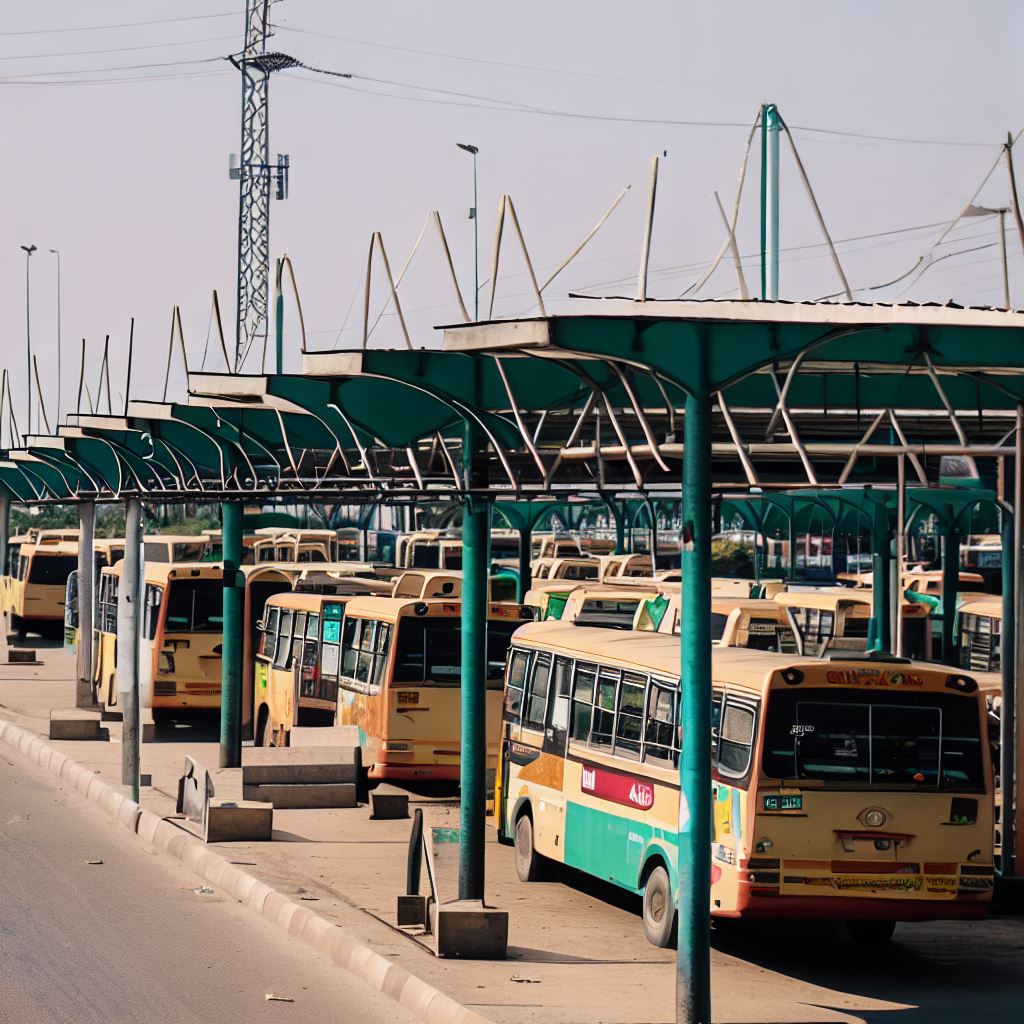Introduction
Becoming a bus driver in Nigeria is a topic of great importance in the transportation sector.
Bus drivers play a crucial role in ensuring efficient and reliable transportation for the masses.
This blog post aims to provide aspiring individuals with the necessary steps and qualifications to pursue a career in bus driving.
Overview of the Transportation Sector in Nigeria
A. The significance of transportation in Nigeria’s economy
Transportation is a crucial sector in Nigeria’s economy, playing a significant role in its development and growth.
With a population of over 200 million people and a vast land area, the demand for transportation services is high.
From personal commuting to trade and commerce, transportation is essential for the country’s socioeconomic activities.
B. The role of bus drivers in providing public transportation services
One of the key players in providing public transportation services in Nigeria is the bus drivers.
They are responsible for carrying passengers safely and efficiently from one destination to another.
Bus drivers operate various types of buses, including mini-buses, luxury buses, and long-distance buses, catering to the diverse needs of commuters.
C. How the sector contributes to employment opportunities
The transportation sector in Nigeria offers ample employment opportunities, with bus driving being a popular occupation.
To become a bus driver, specific qualifications and steps are essential to ensure competence and professionalism.
To become a bus driver, start by obtaining a valid driver’s license through driving school, passing written and practical tests, and receiving road safety training.
After obtaining a driver’s license, aspiring bus drivers should gain experience by working as assistant drivers or conducting short-distance drives.
This hands-on experience builds confidence, hones driving skills, and provides insights into the challenges of public transportation.
Aspiring bus drivers need essential skills and traits. They must possess effective communication skills to interact with passengers and handle on-road situations.
Patience and composure are crucial as they often face traffic congestion and challenging passengers.
Bus drivers must possess not only qualifications but also a deep understanding of their routes, encompassing traffic, alternatives, and landmarks, for efficient, punctual services.
Safety is paramount for bus drivers. They must strictly adhere to traffic regulations, avoid reckless driving, and conduct routine vehicle inspections.
Timely reporting of any faults or mechanical issues is essential to ensure passenger safety.
The transportation sector in Nigeria offers significant employment opportunities, particularly in rural areas with limited job prospects.
Becoming a bus driver enables individuals to support their families and contribute to the local economy.
In a nutshell, the transportation sector plays a crucial role in Nigeria’s economy, providing essential services and employment opportunities.
Bus drivers are at the forefront of this sector, ensuring safe and efficient transportation for the public.
By following the necessary steps and acquiring the required qualifications, individuals can pursue a rewarding career as a bus driver in Nigeria.
Read: Top 5 Sommelier Schools in Nigeria for Aspiring Experts
Qualifications and Skills Needed to Become a Bus Driver
When it comes to becoming a bus driver in Nigeria, there are certain qualifications and skills that are essential.
In this section, we will discuss the importance of a valid driver’s license, the required educational qualifications, and other necessary skills to succeed in this profession.
A. The Importance of a Valid Driver’s License and Clean Driving Record
Obtaining a valid driver’s license is the first step towards becoming a bus driver.
It is a legal requirement and ensures that you have the necessary skills and knowledge to operate a vehicle safely.
Additionally, having a clean driving record, free of any major violations, is crucial in proving your reliability and responsibility as a driver.
B. Required Educational Qualifications
In terms of educational qualifications, a minimum secondary school certificate is often required to become a bus driver in Nigeria.
This requirement ensures that drivers have a basic level of education, which is essential for understanding road signs, safety regulations, and effectively communicating with passengers.
It also demonstrates a certain level of responsibility and commitment.
C. Other Skills Necessary
Aside from a valid driver’s license and the required educational qualifications, there are other skills that are necessary to excel in this profession.
Good communication skills are vital for interacting with passengers, providing directions, and handling any conflicts that may arise.
Patience is another crucial skill for bus drivers. Dealing with congested traffic, unruly passengers, and unexpected delays requires the ability to stay calm and composed.
This skill contributes to maintaining a safe and pleasant environment for both passengers and the driver.
Furthermore, defensive driving techniques are essential for bus drivers.
Navigating through busy streets and unpredictable traffic situations demands the ability to anticipate potential hazards and react appropriately to ensure the safety of passengers and other road users.
These techniques involve constant vigilance, remaining focused, and adhering to traffic rules at all times.
In fact, becoming a bus driver in Nigeria requires several qualifications and skills.
These include a valid driver’s license, a clean driving record, a minimum secondary school certificate, good communication skills, patience, and defensive driving techniques.
By possessing these attributes, aspiring bus drivers can ensure their success in this challenging yet rewarding profession.
Read: Continuing Education: Courses for Beauty Therapists in Nigeria

Step-by-Step Guide to Becoming a Bus Driver in Nigeria
1. Obtaining a Driver’s License
A. The process of obtaining a driver’s license
To become a bus driver in Nigeria, the first step is obtaining a driver’s license.
This involves:
- Learner’s Permit: Apply for a learner’s permit at the local Driver’s Licensing Office. You’ll need to provide proof of identity, age, and address.
- Written Test: Pass a written test on road signs, traffic rules, and regulations. Study materials are often available at licensing offices.
- Practical Training: Enroll in a driving school for practical training. This includes learning how to operate a vehicle, obey traffic laws, and practice safe driving techniques.
- Practical Test: Take a practical driving test to demonstrate your driving skills. You’ll be evaluated on your ability to handle a vehicle safely.
B. The required documents and fees
To obtain a driver’s license, you’ll typically need:
- Proof of identity (e.g., national ID card, international passport)
- Proof of address (utility bills, rent agreement)
- Passport-sized photographs
- Application form
- Medical certificate
Fees vary by state and license class but generally range from ₦6,000 to ₦15,000.
2. Meeting the Educational Qualifications
A. The minimum educational qualifications necessary
There are no strict educational requirements to become a bus driver in Nigeria.
However, having a secondary school certificate (SSCE) or its equivalent can be beneficial.
B. Provide options for those who do not meet the requirements
If you do not meet the educational requirements, consider completing your secondary education.
Alternatively, you can gain practical experience as an assistant driver or in smaller transport companies.
3. Enroll in a Driving School
A. The benefits of enrolling in a reputable driving school
Enrolling in a reputable driving school offers several benefits, including:
- Structured training programs
- Experienced instructors
- Access to vehicles for practice
- Knowledge of local traffic laws
- Increased confidence in driving skills
B. The curriculum and practical training provided at driving schools
Driving schools in Nigeria typically offer a comprehensive curriculum covering:
- Vehicle operation and maintenance
- Defensive driving techniques
- Traffic rules and regulations
- Road safety measures
- Emergency handling procedures
Practical training includes hands-on experience in real traffic conditions.
4. Completing the Necessary Training
A. The training programs available for bus drivers in Nigeria
Bus driver training programs focus on:
- Vehicle handling and safety
- Passenger management
- First aid and emergency response
- Route planning and navigation
- Customer service skills
B. The importance of practical training, road awareness, and safety protocols
Practical training is crucial for bus drivers. It helps them develop road awareness, learn to handle different road conditions, and understand safety protocols to protect passengers and themselves.
5. Gaining Experience
A. The importance of gaining experience by working as an assistant or in smaller transport companies
To build your career as a bus driver, consider working as an assistant driver or in smaller transport companies.
This hands-on experience is invaluable for improving your skills and building confidence.
B. The necessity of building a good driving record and reputation
Maintain a clean driving record and a reputation for safety and reliability.
A good track record enhances your prospects for better job opportunities in the future.
By following these steps and continuously improving your skills, you can embark on a successful career as a bus driver in Nigeria.
Read: Client Retention Strategies for Beauty Therapists in Nigeria
Additional Requirements and Considerations
Embarking on a career as a bus driver in Nigeria is not just about steering a vehicle through the bustling streets.
It’s a commitment to safety, professionalism, and top-notch service. Here’s what you need to know to start your journey down this career path.
First and foremost, you must obtain a medical fitness certificate, a non-negotiable requirement. Applicants should also be within the specified age limit set by the transport authority.
Safety matters, and adhering to traffic laws is crucial. This not only keeps everyone safe but also prevents legal complications and penalties.
Professionalism is highly valued in this profession. Bus drivers are expected to maintain a high level of decorum and provide outstanding customer service.
Good communication skills, a friendly attitude, and punctuality can enhance your reputation among passengers.
You should also possess excellent driving skills, hold a valid commercial driver’s license, and maintain a clean driving record.
While a secondary school certificate may be preferred, vocational training or certification programs can significantly boost your employment prospects.
Physically, you need to be fit, with good eyesight and hearing, as regular health check-ups are necessary to maintain your medical fitness certificate.
By meeting all these qualifications and requirements, you can pursue a fulfilling career as a bus driver in Nigeria. It’s a chance to serve the public, contribute to the transportation sector, and secure a stable income.
Read: Social Media Tips for Promoting Beauty Therapy in Nigeria
Conclusion
Becoming a bus driver in Nigeria requires specific steps and qualifications. Firstly, obtaining a valid driver’s license is crucial.
Additionally, aspiring drivers should undergo proper training and acquire necessary certifications. It is also important to have good communication skills and a clear understanding of traffic regulations.
Bus drivers play a significant role in the transportation sector. They ensure people reach their destinations safely and efficiently.
They contribute to the economy by facilitating the movement of goods and individuals. Without bus drivers, commuting would be challenging and the economy would suffer.
For individuals aspiring to become bus drivers, it is crucial to pursue their goals with determination.
They should remain committed to safety and professionalism, considering the responsibility they hold.
It is essential to prioritize passenger safety and maintain a respectful and courteous attitude towards passengers.
In the end, becoming a bus driver in Nigeria can be a rewarding and fulfilling career choice.
By following the necessary steps and acquiring the required qualifications, individuals can embark on a journey that contributes to society.
Aspiring drivers should remember that safety, professionalism, and dedication should always be their top priorities.




